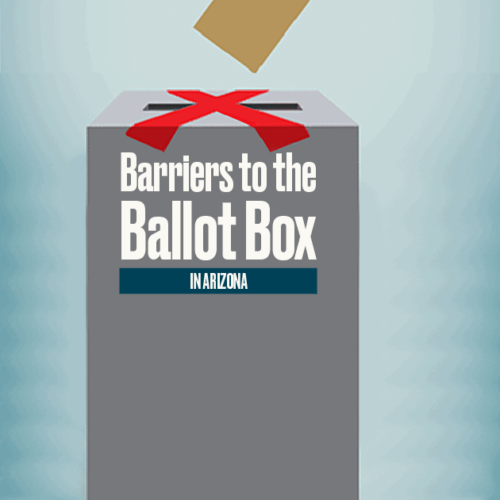Introduction
Arizona’s aggressive disenfranchisement of Latino and Native American voters put it on the Voting Rights Act’s list of states that were required to get “preclearance” from the federal government before making changes that could restrict access to voting.
Since the U.S. Supreme Court struck down that part of the law in 2013, Republicans have worked in the legislature and courts to put new restrictions in place. Now an Arizona measure banning efforts to encourage absentee balloting is headed to the U.S. Supreme Court in another major test of the Voting Rights Act.
Sign up for The Moment newsletter
Our CEO Susan Smith Richardson guides you through conversations and context on race and inequality.
The state has also placed limits on early voting. And it has some of the harshest restrictions in the country on the voting rights of people who’ve been convicted of a crime, effectively prohibiting 4.3% of the adult population from casting a ballot.
Here’s a look at some of the most significant updates on restrictions to voting rights and access in the state:
Vote by mail
Arizona is set up for mail-in voting. It’s one of 34 states that allows registered voters to request an absentee ballot without a reason, and voters don’t need to request one every election cycle. They can choose to vote by mail in every election.
That’s likely why 80 percent of the state’s registered voters are signed up to vote by mail, making Arizona uniquely prepared to handle an election amid the COVID-19 pandemic. That said, the state has made it difficult for many voters to cast their ballot, particularly Native American and Latino voters.
In June, Democrats challenged state mail-in ballot rules that let election officials throw out absentee ballots that don’t have signatures. In Maricopa County, for example, election officials discarded 18,420 mail-in ballots between 2008 and 2018 for that reason, according to a lawsuit filed in federal court.
“The rule disproportionately impacts communities of color and Tribal Nations, who are more likely to have their ballots rejected due to missing signatures,” lawyers for the Democratic National Committee wrote in the complaint.
In September, a federal judge ruled in favor of Democrats, requiring the state to let voters add their missing signatures up to five days after the election. The state is appealing the decision.
Ban on absentee assistance
The U.S. Supreme Court has agreed to hear a case involving Arizona’s controversial ban on absentee ballot return assistance. that Republicans have labeled such assistance “ballot harvesting.”
The Republican-controlled legislature passed a law in 2016 that made it a crime for people to pick up someone else’s filled-out ballot to deliver to polling stations. Republicans said it created the potential for fraud. Democrats said it was a blatant attempt to stop Native American and Latino voters from participating in the election.
Democrats sued. A trial judge upheld the ban, and so did a three-judge panel on the Ninth Circuit Court of Appeals. Democrats then appealed the decision to the full court. In January, a majority of the Ninth Circuit judges overturned the ban. The judges said there was no evidence of fraud and that the ballot harvesting ban violated the Voting Rights Act because it disproportionately harmed Native American, Latino and Black voters.
The decision found that these communities do not have reliable mail service and depend on civic and political groups to get their ballots delivered on time.
Voting rights advocates fear that the appeal by Arizona Republicans to the U.S. Supreme Court, which has agreed to hear the case, could be an opportunity by the court’s conservative majority to expand on the Shelby decision and further weaken the federal Voting Rights Act.
In a separate case, a judge has rejected an effort to get the state to count mail-in votes that arrive after the 7 p.m. close of polls on Election Day as long as they’re postmarked before then. Members of the Navajo Nation had argued that they were disproportionately affected by slow mail service and an inadequate number of ballot drop-off locations.
Language access
Arizona has a long history of using language barriers to disenfranchise Native American and Latino voters.
For more than 60 years, Tthe state required voters to pass a strict literacy test for more than 60 years in order to register, which kept many Mexican-American, Apache and Navajo voters from participating in its elections.
Under the Voting Rights Act, Arizona is required to provide language assistance to Latino and Native American voters in 10 of the state’s 15 counties. For example, Yuma County must provide translated voting materials in Spanish, and Graham County must provide Apache interpreters if needed.
This type of language assistance is “imperative,” according to the U.S. Commission on Civil Rights, considering that 31% of the state’s residents are Latino and 5% are Native American.
But voting rights experts say that several counties don’t offer the language assistance or make it hard to find. For example, Graham County, which must provide language assistance in Apache, does not mention how to get help in Apache on its elections website. Neither does Pinal County.
Read more in Money and Democracy
US Polling Places
In Kentucky, eliminating voting-access restrictions — temporarily
After advocates sued, the governor and secretary of state worked out a pandemic voting plan that offers residents more ways to safely cast a ballot.
US Polling Places
In Michigan, fear that mail will drive voting inequality
Barriers remain even after a constitutional amendment expanding voting rights.


Join the conversation
Show Comments